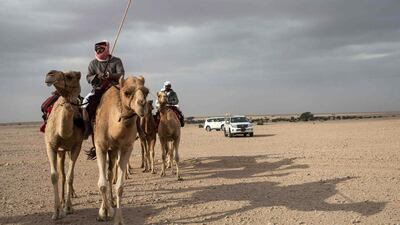Doha // A team of intrepid walkers and their camels wearily arrived in the Qatari capital Doha last night, the last leg of a 49-day trek across the world’s largest sand desert.
The team successfully retraced the historic 1,300-kilometre route taken in 1930 by British civil servant and Arabist Bertram Thomas.
The three-man team walked from Salalah in Oman, through Saudi Arabia, to Doha, across the Empty Quarter – the vast stretch of uninhabited land that includes some of the UAE.
Their journey ended close to the Al Rayyan fort on the western fringes of Doha, last night.
Despite the threat of warring tribes and a constant struggle to find enough water, Thomas completed the journey in 57 days.
The modern-day trekkers led by Omani-based British explorer Mark Evans completed the journey in 49 days.
Evans, 54, said he was in awe of the achievement made by Thomas and his team 85 years ago.
“I would say how humble we are about what those people achieved,” he said, speaking on the penultimate day of the trek.
“They were completely on their own,” said Evans.
His team includes the great, great grandson of Sheikh Salih bin Kalut Al Rashidi Al Kathiri who completed the original journey with Thomas.
“Because it is my great, great grandfather, I wanted to recreate it,” said Sheikh Mubarak Saleh Muhammad Salah bin Kalut. “I am proud that he was part of the original team.”
Unlike Thomas, Evans and his fellow walkers have been able to use GPS and smartphones to communicate with the outside world, while two vehicles carrying water and provisions accompanied them during their journey.
But like Thomas, they have also endured walking across enormous sand dunes in Saudi Arabia, searing day temperatures and cold nights and sleeping without a tent under the stars each evening.
“We look like an Egyptian sarcophagus each morning when we wake up, covered in sand,” said Mr Evans, a fellow of the Explorers Club of New York, and The Royal Geographical Society in London.
As well as recreating the steps of explorers from the 1930, there was also a scientific element to the journey.
The team has found tools and discovered ancient Arabian script in Oman up to 3,000-years-old.
They have also completed a psychological questionnaire each evening for a study in “exercise environment psychology” being carried out at a British university, said Mr Evans.
The team received help from all three countries they have trekked across from assistance at border crossings, to camels being supplied by the Qatari royal family.
These have proved the hardiest as Mr Evans admits that modern-day camels, like humans, “have got a bit soft”.
*Agence France-Presse

